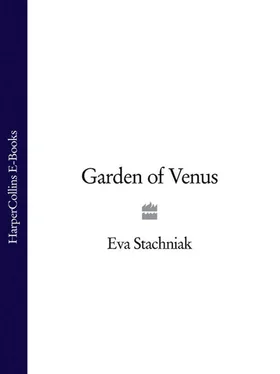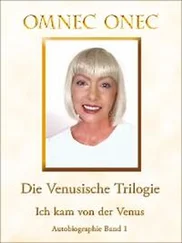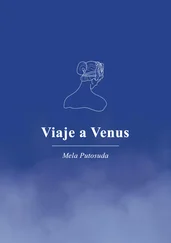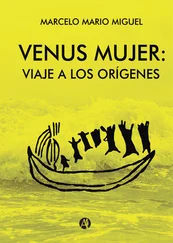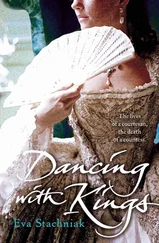EVA STACHNIAK
The Garden of Venus

For Zbyszek
Cover
Title Page EVA STACHNIAK The Garden of Venus
Acknowledgements Конец ознакомительного фрагмента. Текст предоставлен ООО «ЛитРес». Прочитайте эту книгу целиком, купив полную легальную версию на ЛитРес. Безопасно оплатить книгу можно банковской картой Visa, MasterCard, Maestro, со счета мобильного телефона, с платежного терминала, в салоне МТС или Связной, через PayPal, WebMoney, Яндекс.Деньги, QIWI Кошелек, бонусными картами или другим удобным Вам способом.
Historical Note Конец ознакомительного фрагмента. Текст предоставлен ООО «ЛитРес». Прочитайте эту книгу целиком, купив полную легальную версию на ЛитРес. Безопасно оплатить книгу можно банковской картой Visa, MasterCard, Maestro, со счета мобильного телефона, с платежного терминала, в салоне МТС или Связной, через PayPal, WebMoney, Яндекс.Деньги, QIWI Кошелек, бонусными картами или другим удобным Вам способом.
PART ONE PART ONE From Mes amours intimes avec la belle Phanariote Bursa—where our story so humbly begins—a town spreading at the feet of Moundagnà or Mount Olympus is but a day’s journey from Istanbul. Mars, Neptune, and Venus had once been worshipped there, and they could still lay their claims to this land on account of the valiant warriors hailing from the Greek Empire and Byzantium, on account of sailors recruited here, and on account of modern Lais and Phrynes whose presence adorns the cafes and bawdyhouses of Istanbul. The worshippers of the Love goddess, I hasten to add, are of both sexes, for the boys ministering to the desires of the Byzantines are as beautiful here as the girls. Beholding the multitude of beautiful faces in this mountainous and healthy region, one is tempted to say that, for such delightful fruit to be so plentiful, Aphrodite, sailing in her conch from Cytera to Paphos, must have unloaded in this land some of her precious cargo, her aphros, that essence of pleasure and beauty, the source of our very existence. For this region has always supplied the world with superior talents from the realm of Venus, natural talents capable, with little effort, of conquering the hearts of courtiers and kings. Is this a wonder that, in Istanbul, the terms ‘a girl from Moundagnà’ and ‘a prosperous girl providing fanciful pleasure’ have become synonymous? In this town of Bursa, la belle Phanariote was born in the year of 1760, and very ordinary blood flows in her veins for she is the daughter of a cattle trader and among her relatives are many a ferryman, craftsman, and a shopkeeper. * Her childhood was spent in the fields and meadows surrounding her native town where she led that free and naïve existence so much praised by some philosophers of yesterday. * So much for the rumours of her descent from Pantalis Maurocordato, her kinship with the former rulers of Byzantium!
BERLIN, 1822: Water
PART TWO
BERLIN, 1822: Laudanum
PART THREE
BERLIN 1822: Opium
PART FOUR
BERLIN, 1822: Morphine
Copyright
About the Publisher
From Mes amours intimes avec la belle Phanariote
Bursa—where our story so humbly begins—a town spreading at the feet of Moundagnà or Mount Olympus is but a day’s journey from Istanbul. Mars, Neptune, and Venus had once been worshipped there, and they could still lay their claims to this land on account of the valiant warriors hailing from the Greek Empire and Byzantium, on account of sailors recruited here, and on account of modern Lais and Phrynes whose presence adorns the cafes and bawdyhouses of Istanbul. The worshippers of the Love goddess, I hasten to add, are of both sexes, for the boys ministering to the desires of the Byzantines are as beautiful here as the girls.
Beholding the multitude of beautiful faces in this mountainous and healthy region, one is tempted to say that, for such delightful fruit to be so plentiful, Aphrodite, sailing in her conch from Cytera to Paphos, must have unloaded in this land some of her precious cargo, her aphros, that essence of pleasure and beauty, the source of our very existence. For this region has always supplied the world with superior talents from the realm of Venus, natural talents capable, with little effort, of conquering the hearts of courtiers and kings. Is this a wonder that, in Istanbul, the terms ‘a girl from Moundagnà’ and ‘a prosperous girl providing fanciful pleasure’ have become synonymous?
In this town of Bursa, la belle Phanariote was born in the year of 1760, and very ordinary blood flows in her veins for she is the daughter of a cattle trader and among her relatives are many a ferryman, craftsman, and a shopkeeper. * Her childhood was spent in the fields and meadows surrounding her native town where she led that free and naïve existence so much praised by some philosophers of yesterday.
* So much for the rumours of her descent from Pantalis Maurocordato, her kinship with the former rulers of Byzantium!
BERLIN, 1822: Water
Rosalia
In the end it fell to Rosalia to make sure that the imminent departure of Countess Sophie Potocka (accompanied by her daughter, Countess Olga Potocka, and companion Mademoiselle Rosalia Romanowicz) via Paris to the town of Spa for her prescribed water cure—had been announced three times in the Petersburg Gazette. Only then the passports could be collected and the padrogna —the permission to hire horses on the way—be signed by the Governor General.
The countess left St Petersburg on 12th July, 1822, (July 1st in the Russian style). ‘On Paris, I insist with utmost gravity,’ Dr Horn said—his voice raised, as if defending himself and not offering medical advice—‘French surgeons are far superior, even to the English.’ Before departure, everyone, including the servants, sat around the breakfast table to pray for a safe journey. They had already been to confession, asked forgiveness for their sins from everyone in the household, and exchanged parting gifts with those who would be left behind, sashes with sweet-smelling lavender, ribbons, holy pictures, and boxes lined with birch bark.
The morning was cold and wet, but, thankfully, the thunderstorm had ended and there was no more talk of omens, in spite of Marusya’s dream about her teeth falling out and making a clunking sound as they scattered on the marble floor of the hall. (‘Why didn’t you stop this foolish talk,’ Olga snapped, as if Rosalia could have.)
The kitchen carriage left first, with provisions, cooking utensils and a collapsible table, since the inns en route with their smutty ceilings and walls grown shiny from the rubbings of customers’ backs were not to be trusted. Two more carriages were packed with luggage, one carrying a trunk that opened to convert into a bedstead with pillows, so that the countess could rest during the journey.
Читать дальше
